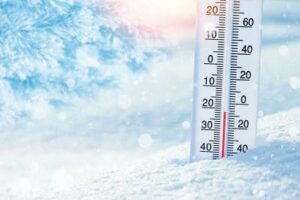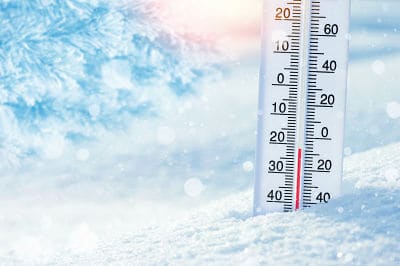 Illinois is forecasted to face the coldest weather conditions since the state’s polar vortex in January 2019, with the National Weather Service predicting that wind chills could reach as low as 25 degrees below zero in the Chicago area. In response, the State of Illinois has released guidelines on how you and those around you can stay safe during Chicago’s freezing winter weekend.
Illinois is forecasted to face the coldest weather conditions since the state’s polar vortex in January 2019, with the National Weather Service predicting that wind chills could reach as low as 25 degrees below zero in the Chicago area. In response, the State of Illinois has released guidelines on how you and those around you can stay safe during Chicago’s freezing winter weekend.
Frostbite
The Illinois Department of Public Health (IDPH) warns that frostbite could set in on exposed skin in as little as fifteen minutes under the conditions forecasted for this freezing winter weekend. The body parts most commonly affected by frostbite include the face, ears, hands, and feet. Frostbitten skin turns whitish and stiff, with the impacted area feeling numb rather than painful.
If you get frostbite, DO NOT rub the affected area, as friction can damage the skin tissue. Instead, warm the frostbitten part of the body gradually, wrap it in blankets, sweaters, coats, or other coverings, and seek medical attention immediately.
Hypothermia
Hypothermia is a condition caused by a drop in body temperature to 95 degrees or less. The elderly and infants are particularly at risk of hypothermia, which can be deadly if it is not detected promptly and treated properly. Signs of hypothermia include:
- Shivering
- Exhaustion
- Drowsiness
- Confusion
- Slurring of speech
- Slow heartbeat
- Weakened pulse
- Bright red, cold skin in infants
Hypothermia sufferers should treat the condition in a hospital, NOT at home.
Dressing for the Outdoors
While the IDPH strongly suggests staying indoors for the duration of the freezing winter weekend, residents who need to go outside should follow these recommendations:
- Wear multiple layers of lightweight clothing instead of one or two layers of heavier garments. The air trapped between the layers works as insulation to keep the body warmer.
- Cover your head, where as much as 50 percent of body heat may be lost.
- Wear mittens instead of fingered gloves.
- Cover your ears and the lower part of your face, as these areas are most susceptible to frostbite. A scarf over your mouth can also protect your lungs from directly inhaling extremely cold air.
- Wear warm leg coverings, waterproof boots or sturdy shoes that provide maximum traction, and either heavy socks or two pairs of lightweight socks.
Home Heating
Even if you stay inside throughout this freezing winter weekend, you are not necessarily safe from harm, since improper home heating has proven deadly for many families over time. More than 400 people in the United States die from accidental carbon monoxide poisoning each year.
Carbon monoxide can be found in fumes produced any time you burn fuel in motor vehicles, stoves, gas ranges, grills, furnaces, fireplaces, lanterns, or small engines. It can build up indoors and poison people and animals who breathe it in.
To help avoid carbon monoxide poisoning:
- Never use a generator inside your home, basement, or garage.
- Do not use an oven or stove to heat your home.
- If you use a space heater, make sure it is kept at least three feet away from flammable items such as sofas, curtains, and blankets.
- Look out for the signs for carbon monoxide poisoning, which may include dizziness, headaches, confusion, weakness, chest pains, upset stomach, and vomiting.
Neighbors Who Live Alone
Statistics show that 46 percent of individuals rely on neighbors for help within the first 72 hours after an emergency or disaster. With this in mind, Gov. Pritzker encourages people to check on elderly neighbors who might be in need of assistance.
“We need to reach out to our friends and neighbors,” says Pritzker. “If you know of someone who needs help, please contact your local law enforcement officials.”
Traveling
Public safety officials are urging the public to avoid any unnecessary travel during this freezing winter weekend. But if you absolutely must go somewhere, you should observe the following guidelines:
- Watch out for slick spots that may have formed on ramps, bridges, overpasses, and shaded areas overnight because of subzero temperatures.
- Be mindful of high winds that can decrease visibility.
- Change lanes when approaching police, first responders, and broken-down vehicles as required under Illinois law.
- Slow down for snow plows and maintenance vehicles, giving them plenty of room to operate.
- Make sure that your vehicle has an emergency kit equipped with blankets, non-perishable food, boots, extra clothing, and other items in case you get stranded.
- Never leave your vehicle in the event of a breakdown. Call for help and wait for assistance to arrive instead.
Attorneys Serving Drivers Under All Conditions
We hope that these tips will help keep you and your loved ones safe and healthy during this freezing winter weekend. Remember to stay indoors if possible and to take all the necessary precautions if you do have to travel.
But if you follow the recommended road safety guidelines and you still find yourself in a traffic accident because of somebody else’s negligence, contact the knowledgeable car accident attorneys here at GWC Injury Lawyers LLC.
With more than $2 billion recovered in verdicts and settlements on behalf of wrongfully injured clients, GWC is one of the leading Personal Injury and Workers’ Compensation law firms in Illinois. Our Chicago car accident lawyers have the experience, the determination, the resources, and the reputation of success necessary to get you and your family the justice you deserve.
If you have been hurt in a car accident, contact GWC today to schedule a free, no-obligation consultation with one of our dedicated attorneys. You may call our office at (312) 464-1234 or click here to chat with a representative at any time.
Have a wonderful, AND SAFE, weekend!
<< BACK TO BLOG POSTS